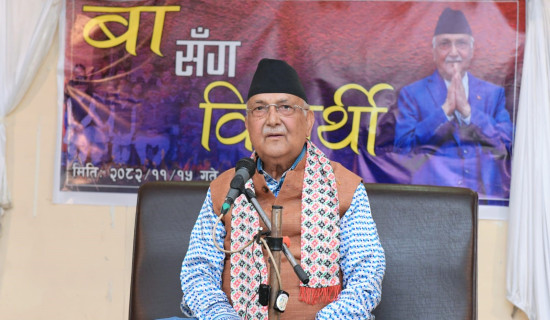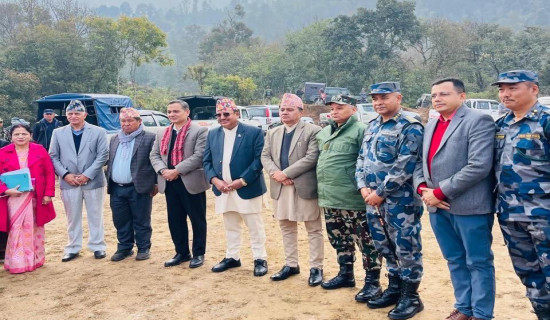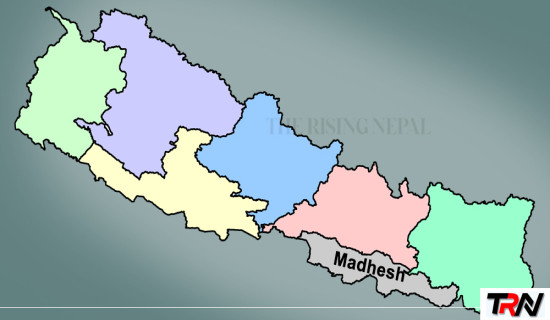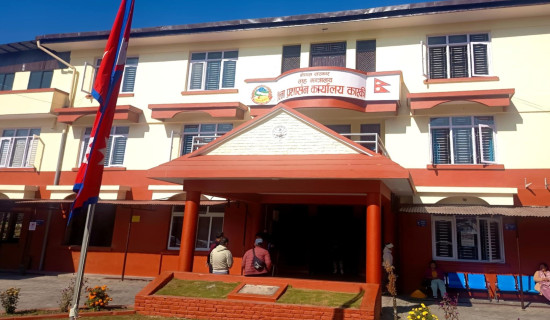- Friday, 27 February 2026
Revamp Social Health Insurance
Health insurance is directly associated with the wellbeing of people. Nepal has a long history of health insurance and the government has also prioritised health insurance. Still, progress on this front is slow. Basic health services are recognised as fundamental rights in the Constitution of Nepal. As stipulated in the constitution, every Nepali is entitled to basic health services and no-one will be deprived of emergency health services. The Public Health Service Act, 2075 stipulates that health-related arrangements will be made in accordance with the prevailing laws.
The National Health Policy, 2076 ensures easy access to specialist health services and also arranges for health insurance for underprivileged people and targeted groups of people on the basis of social justice. Likewise, the Health Insurance Act, 2074 stipulates that the government will involve every Nepali in the health insurance scheme. Health is also prioritised in the Sustainable Development Goals (SDGs). One of the key agendas of the SDGs is to promote wellbeing by ensuring healthy lives.
Universal coverage
The main target is to achieve universal health coverage, including financial risk protection, access to quality essential healthcare services, access to safe, effective and affordable essential medicines and access to vaccines on a universal scale. Provision of health insurance for the poor and the vulnerable is a sine qua non for achieving the target of health for all. Very few countries around the world have fully covered health insurance schemes. European countries, Japan, South Korea, Australia and Israel have achieved almost universal health insurance. On the other hand, Algeria, Mexico, Chile, Slovakia and Türkiye (formerly Turkey) have notched up over 90 per cent health insurance.
Most of the developing countries are struggling to expand the coverage of health insurance. However, sufficient data are not available at the national level. In South Asia, the coverage of health insurance is not satisfactory, with most countries focusing on subsidising the medical treatment of the poor. The treatment package seems to be limited to essential healthcare services. In developing countries, free medicines are not available all the year round.
There are state-funded pro-poor health schemes in India, Pakistan and Bangladesh. Such schemes focus on providing primary healthcare services and subsidising maternal and child healthcare services. But there is no organised practice of universal coverage of insurance. Lack of universal coverage of healthcare has given rise to commercialisation and privatisation of healthcare services, leading to expensive medical costs and reducing public trust on public healthcare facilities.
Although Nepal has given priority to healthcare services, healthcare services are costly. The poor can hardly afford medical costs for serious ailments. For the benefit of such poor people, the government launched the social health insurance scheme six years ago. The scheme has been introduced in all the 77 districts and at 746 local levels. Till date, 5.8 million people have been enrolled in the scheme. And as many as 450 health institutions have been involved in the scheme.
Nepal has adopted the hybrid model of social health insurance, focusing on low cost, limited services and the lower-middle income group of people. Six years down the road, the social health insurance scheme has gradually made progress. However, there are problems and challenges galore. There are also procedural hassles and structural weaknesses on the part of the Health Insurance Board. The Health Insurance Board claims that there is lack of higher-level manpower. For lack of expertise, claim settlement records have remained poor. Further, inspection, coaching and monitoring of service providers have been hampered.
The availability of medicines at designated health institutions is a problem although they are required to keep medicines as per the approved facilities for people. Differential medical treatment between the insured and the non-insured has also been observed. There is a question mark over the preparations and responsibility of designated health institutions. And services are found lacking as per the levels of health institutions. Other problems are lack of digital technology, use of weak apps and lack of interest of local and state governments in the scheme.
For the effective implementation of the social health insurance scheme, several reform measures need to be taken. In the first place, some provisions of the health insurance policy need to be amended. The insured should be given more choices on copayment. Capacity building measures should be adopted for enrolment assistants. Coordination between the Health Insurance Board and healthcare facilitators should be enhanced. What is more, concrete measures should be taken to increase health insurance enrolments and reduce dropouts. A high proportion of dropouts is not desirable.
To ensure the sustainability of the insurance scheme, the 2079/80 policy and programmes, the budget for this fiscal year and provisions of the Health Insurance Act, 2074 should be brought into symphony. The existing infrastructure and human resources and the service delivery mechanism need to be reviewed, and steps taken to improve the situation.
Subsidy enrolments
The Health Insurance Board should properly address subsidy enrolments. It should introduce a wide array of health insurance packages. There should be a proper monitoring mechanism for healthcare services and health workers. The enrolment system should be made easier. And alternative ways of paying premiums should be developed so that more and more people will show interest in the scheme. The referral period from one health facility to the other is fixed at seven days in view of the geographical factor. This period should be increased for the convenience of the insured. The healthcare packages should be diversified as per the demand of the people.
Considering the importance of the scheme, a nation-wide campaign needs to be launched to attract as many people as possible to the scheme. If possible, obligatory enrolments should be introduced. Enrolment assistants should be motivated in their work by means of a better remuneration package with good perks. The scheme should be operated in a sustainable way. For this, federal, state and local governments, along with health institutions, health workers and other stakeholders, should work in tandem to make the scheme sustainable for the common benefit of the people, especially from low social strata.
(Maharjan has been regularly writing on contemporary issues for this daily since 2000. uttam.maharjan1964@gmail.com)














-original-thumb.jpg)

